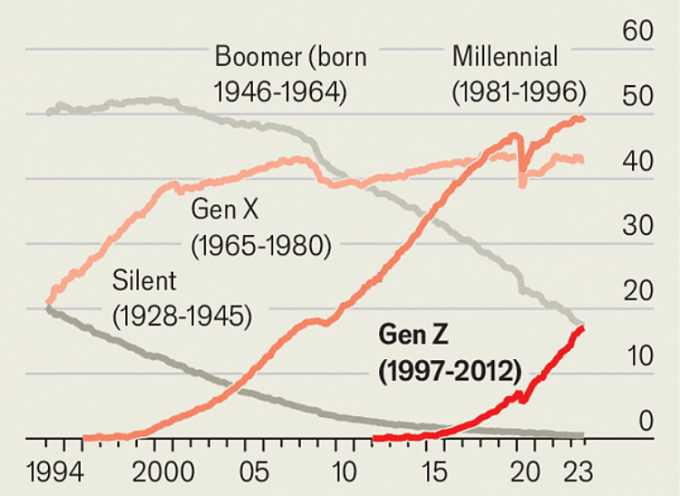Gen Z earns more money and finds jobs more effectively than previous generations, changing the way young people approach the labor market.
Generation Z (born 1997-2012) is asserting its position globally. According to the Economist , at least 250 million people of Generation Z are living in rich countries, about half of whom are employed.
In the US, the number of Gen Z working full-time is about to surpass the baby boomer generation, those born between 1946 and 1964. Gen Z in the US is also increasing its influence, with more than 6,000 CEOs and 1,000 politicians belonging to this generation.
As the role of Gen Z becomes increasingly important, experts say governments , companies, and investors need to understand this shift.

American students walk on the campus of Harvard University, USA. Photo: Reuters
According to commentators at the Economist, previous perceptions of Gen Z were often heavily influenced by a number of studies, including the work of psychologist Jonathan Haidt of New York University.
Mr. Haidt's research has had a major impact on child management policies around the world , notably plans to ban smartphones and social networks in the UK and US, but not everyone agrees with this psychologist.
The notion of “Generation Anxiety” has overshadowed one of the most distinctive and remarkable characteristics of Gen Z: their strong economic advantage and ability to find work effectively. The unemployment rate for Gen Z youth in developed countries is at 13%, the lowest since 1991.
Many Millennials (born between 1981 and 1996) entered the workforce during the global financial crisis of 2007-2009 and were hit hard. In 2012-2014, more than 50% of young people in Spain were unemployed, and the rate in Greece was even higher.
While the main working ideology of Millennials is "work hard if you want to live well", Gen Z believes that they "can quit and find another job if they want a higher income".
Unemployment in Greece is now down by half from its peak a few years ago, as Gen Z tends to look for more employable fields of study.

Full-time employment rates by generation in the US. Graphic: Economist
In the UK and the US, Gen Z students prefer practical subjects such as economics and engineering. Those who do not go to university are also more likely to attend vocational schools and benefit from the shortage of workers in certain professions.
In the US, hourly wages for 16-24 year olds have recently increased by 13% year-on-year, compared with a 6% increase for 25-54 year olds. In the UK, hourly wages for 18-21 year olds have increased by 15%, far outpacing the increase for other age groups. In New Zealand, wages for 20-24 year olds have increased by 10% compared with an average of 6%.
The economic power of Gen Z was reflected in the recent music concert of young singer Olivia Rodrigo, in which the majority of the audience were teenagers willing to pay hundreds of dollars for a ticket to the event.
Some Gen Zers believe that their high incomes are just a facade, as they are saddled with higher housing costs and college tuition than previous generations. Graduates are carrying more debt, while home prices are near all-time highs.
But in reality, Gen Z is dealing with all of this while making the most money in history. The median annual household income for 25-year-olds in the US is $40,000, 50% higher than the average for baby boomers their age.
In 2022, Americans under 25 will spend 43% of their after-tax income on housing and education, including college loan interest, only slightly less than previous generations. Their homeownership rate is also higher than that of Millennials of the same age. Gen Z also saves more money than young adults did in the 1980s and 1990s.
According to the Economist, Gen Z's high income leaves differences in working mindset compared to the Millennials generation.
Millennials see work as a privilege and often want to please their superiors. Gen Z, on the other hand, believe that work is a right, work just enough to avoid being fired, and prioritize self-care.
By 2022, Americans aged 15-24 will spend 25% less time on work-related activities than in 2007. Research from the University of San Diego shows that the proportion of 17-18 year olds in the US who consider work "the center of their lives" has dropped sharply.

New Yorkers stroll on the streets of Manhattan, February 2023. Photo: AFP
Another consequence is that Gen Z is less likely to be an entrepreneur. According to the Economist, only 1.1% of 20-somethings in Europe run a business. That proportion has fallen in recent years. Meanwhile, more than 1% of the world’s billionaires in the late 2000s were Millennials.
Gen Z is also thought to produce fewer innovative ideas. Russell Funk, an expert at the University of Minnesota, says young people in the US are filing fewer patent applications than before. The same is true for music.
Experts are uncertain about the longevity of Gen Z’s economic advantage. Future economic downturns are expected to hit younger generations harder than other groups. Artificial intelligence (AI) could also destabilize the global economy, even if Gen Z is benefiting from it.
But for now, Gen Z has a lot to be grateful for. Midway through a concert in New York, singer Olivia Rodrigo sat at the piano and told fans to be grateful for everything they have.
"Being an adult is great. You have all the time and money to do whatever you want," she said.
Duc Trung (According to Economist )
Source link





































![[Photo] Parade to celebrate the 50th anniversary of Laos' National Day](/_next/image?url=https%3A%2F%2Fvphoto.vietnam.vn%2Fthumb%2F1200x675%2Fvietnam%2Fresource%2FIMAGE%2F2025%2F12%2F02%2F1764691918289_ndo_br_0-jpg.webp&w=3840&q=75)
![[Photo] Worshiping the Tuyet Son statue - a nearly 400-year-old treasure at Keo Pagoda](/_next/image?url=https%3A%2F%2Fvphoto.vietnam.vn%2Fthumb%2F1200x675%2Fvietnam%2Fresource%2FIMAGE%2F2025%2F12%2F02%2F1764679323086_ndo_br_tempimageomw0hi-4884-jpg.webp&w=3840&q=75)










































































Comment (0)